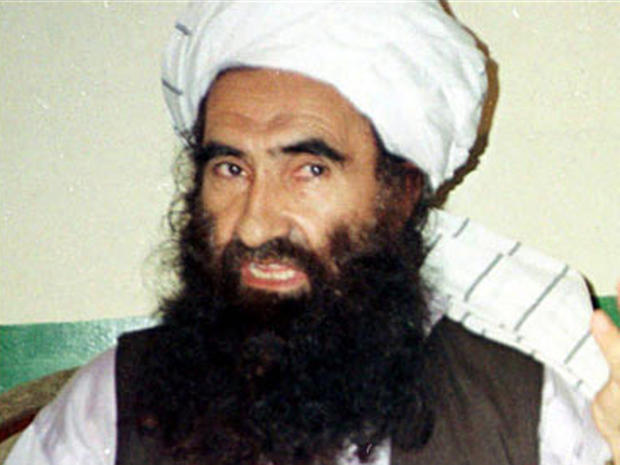Tea and honey with the "lion of God"
On Friday, the Obama administration announced its decision to declare the Pakistan-based Haqqani network a terrorist body, subjecting all of its members to financial sanctions. This post was written by CBS News terrorism consultant Jere Van Dyk, who has worked in Afghanistan as a journalist over a 30-year period. He is the author of "In Afghanistan," about his time living with Mujahideen in the 1980s, and "Captive," about his time as a prisoner of the Taliban in 2008. He worked in Afghanistan and Pakistan for CBS News, off and on, from 2001 to 2008.
In July 1973, the former Afghan Prime Minister Sardar Daoud Khan overthrew King Zahir Shah, who was his brother-in-law and first cousin, and established the Republic of Afghanistan. There was no sign of Islamic fundamentalism in Kabul then. School girls wore short skirts and long socks and laughed in the streets. There were outdoor restaurants, Russian movies, hippies, the smell of hashish, garbage and wood burning stoves. Long camel caravans moved slowly through the city, silent in the afternoon sun.
That same year Burhanuddin Rabbani, a professor at the Islamic Faculty, Kabul University, where he founded the Muslim Youth Organization (MYO), sent a letter to Daoud, called by some Afghans the "Red Prince" for his liberal leanings. "If you free yourself from the communists, we will accept you," Rabbani wrote.
"The communists had power and we realized that we had to flee," he told me in late 2006.
About 12 students led by Gulbadeen Hekmatyier and Ahmed Shah Massoud fled to Peshawar. There, Maj. Gen. Nassarullah Babar, inspector general of Pakistan's Frontier Corps, secretly put them in the Pakistani army. "We gave them code names, Pakistani passports, and brought over Rabbani to be their leader," he told me in 2003. "I told the U.S. Embassy what we were doing."
"We established a Shura (Islamic Council) in Peshawar," Rabbani said.
In July 1975, the young men launched their first attacks in Afghanistan. They called themselves the "Mujahideen," or holy warriors.
At this time, Jalaladin Haqqani, born in Paktia Province, Afghanistan, a member of the Zadran tribe, whose lands are on both sides of the Afghan-Pakistani border, was attending Dar al'Uloom Haqqania, a madrasa near Peshawar. As is common among Afghans, he created his own name: Jalaladin means "lion of God;" Haqqani is from "al-Haqqania." He returned home and began to preach jihad against Kabul. He was a malang: a mullah who stood by the road near his small baked-mud mosque begging for money.
Complete Coverage: Afghanistan
Haqqani: Terrorist label may bring American POW "hardships"
Marxists overthrew Daoud in 1978 and formed a communist government. Haqqani joined Hezbi-i-Islami Khalis (The Islamic Party), a mujahideen political party led by Yunus Khalis, based in Peshawar.
In 1979, Osama bin Laden followed his former university professor Abdullah Azzam from Saudi Arabia to Peshawar.
I met Hekmatyier, Rabbani, Khalis, and other Mujahideen leaders in October 1981, when I went to Peshawar as a freelance reporter for The New York Times. Each of the men had their own political parties, backed by Pakistan, our ally fighting the Soviet Union. With Yunus Khalis' men I travelled to Miran Shah, North Waziristan, and up into Afghanistan to the compound of Jalaladin Haqqani.
He was on the dirt floor in his room, reading a map with other men, when I arrived. He ordered a plate of honey for me to go with my tea. He had a long dark beard, wore glasses and smiled warmly. Every day, five times a day, he stood on the roof of his room, cupped his hands and called his men to prayer. Before going into battle against the Afghan Army and its Soviet backers, he stood on a rock and put the Koran out and his men passed under it as they went off to battle. Haqqani and I rode horses together in the mountains. He always made sure I had food to eat when there was precious little.
One afternoon, an Egyptian army major, disguised as a journalist, came to stay with us, and Haqqani made him stay with me. He hated me because I was American and was happy that Egyptian President Anwar Sadat had been assassinated. The Afghans didn't like him, but deferred to him, because he seemed to have power over Haqqani. He was the beginning of what would become al-Qaeda. I learned that Haqqani had ties to political religious parties in Pakistan and in the Middle East.
For 10 years ending in 1989, the U.S. and its allies, mainly Saudi Arabia, supplied billions of dollars in materiel to the mujahideen, our allies fighting the Soviets. The U.S. sent most if not all of this material to Pakistan, where the ISI, Pakistani military intelligence, distributed it to the Mujahideen groups in Peshawar. The lion's share went to Pashtun fundamentalist leaders Khalis and Hekmatyier, who extended their power from eastern Afghanistan down to Kandahar. Mullah Muhammad Omar, from the south, became part of the Yunus Khalis group.
In 1994, the Taliban came to power and asked the ISI to withdraw its support from the Mujahideen leaders. They wanted to hang them all for destroying Afghanistan. In 1995, Haqqani declared his support for the Taliban. In October 2001, 20 years after I'd first met Haqqani at his compound, Omar appointed him military commander of the Taliban.
In 2002, I returned to Khost. Haqqani's giant marble and hardwood mosque, with turquoise minarets, dominated the skyline of Khost, like a cathedral overlooking a village in France or Spain, just as his network dominates the battle against America, secularism, and westernization in Afghanistan. His second wife is an Arab.
